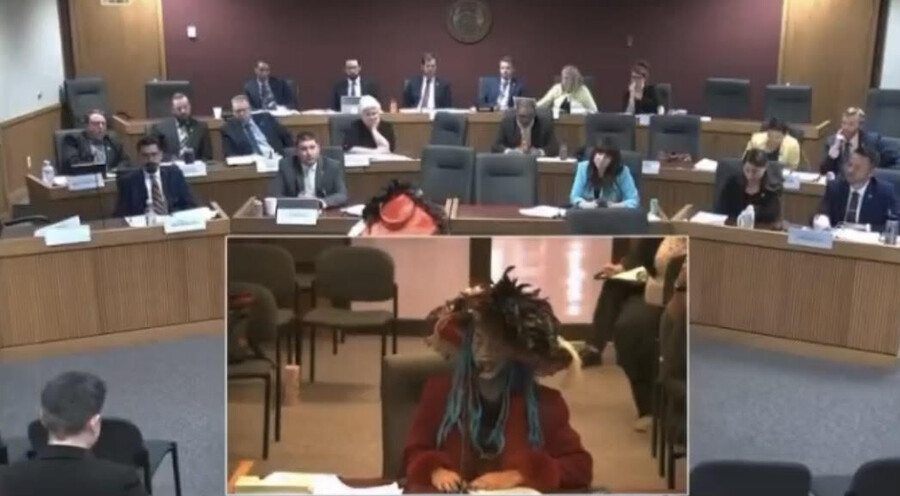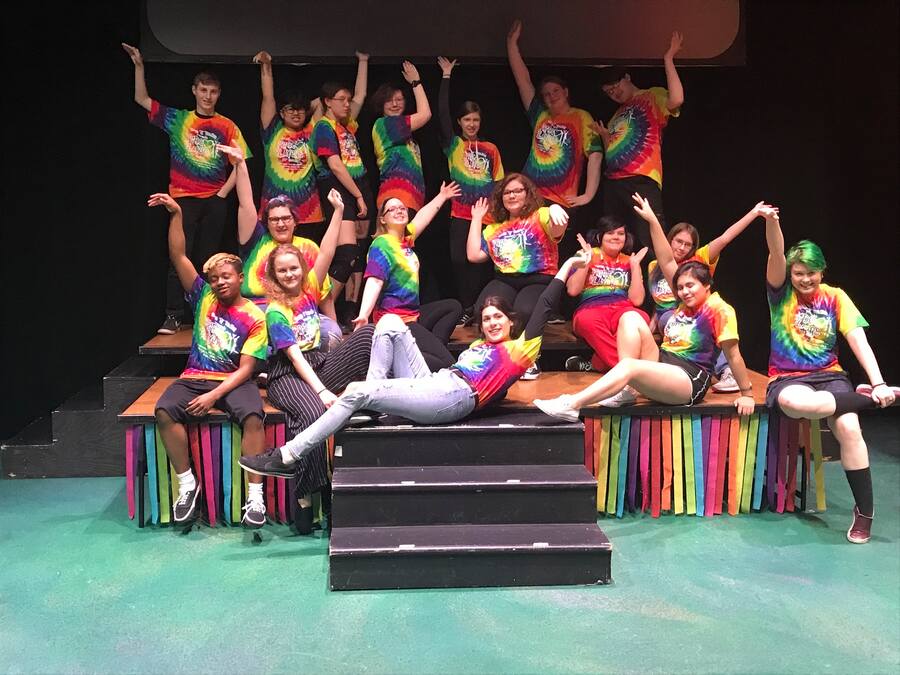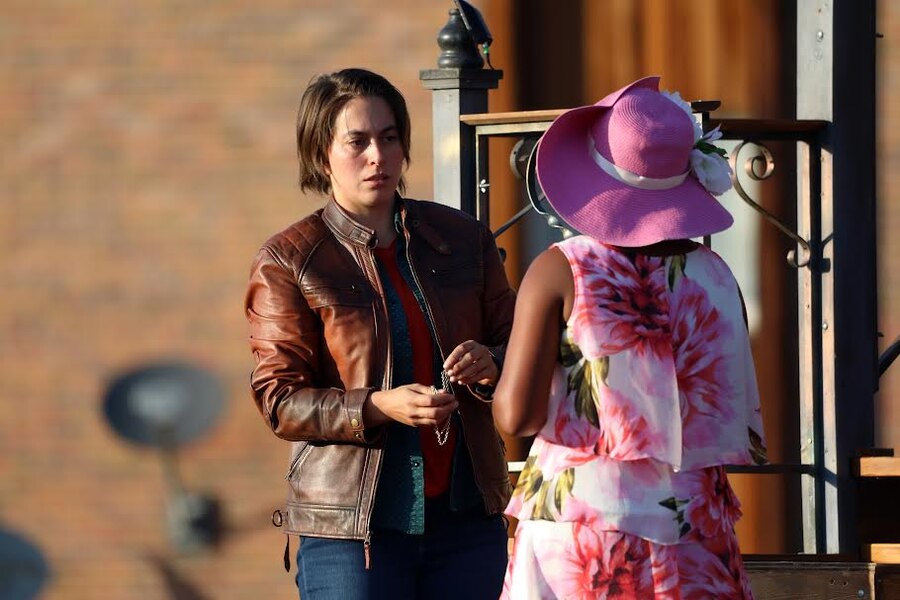The setting: Missouri State Capitol, Hearing Room Seven.
The time: 1:16 a.m., Wed., Jan. 25.
Maxi Glamour stepped forward, impeccably dressed in a long maroon jacket, their signature blue makeup framed by a complementary wig and an oversized hat adorned with flowers. They were there, along with other drag performers. to testify in opposition to the Missouri legislature’s proposed drag bans. These hearings on four bills—two targeting trans youth by limiting their participation in sports and their ability to receive medical care until age 18, and two focusing on banning drag performances—had already featured several hours of discussion, with not a single person testifying in support of the drag bans.
Maxi shared their name, identified themself as a drag performer and costume designer, then began their testimony.
“When I was 13, I started dressing up in different gender clothes and my mother kicked me out,” Maxi began. “I was living outside of my car and the drag community was the only community that would take me in.” They went on to detail the career they’d built since then, appearing in and producing drag shows over the intervening 14 years, in which time they worked with “every single major institution in St. Louis, every museum, every college, and most public libraries. So your taxpayers’ money is going to me, thank you.”
Maxi is a taxpayer too, of course—at one point, they noted, citizens like them “are paying your salaries, making sure that your bad hair jobs get a place to sit down at.” The homophobia and transphobia represented by these anti-drag bills don’t just amount to assault on the artistry of folks like Maxi; they are also on attack on their income and livelihood.
Maxi closed by noting the pressing issues the legislators are not talking about—the opioid epidemic and meth addiction, for starters. “I would love if you all could make sure that you all have the basic needs of Missourians met, so we [drag artists] are not constantly told that we would do better in New York, we would do better in L.A.. Because I love my city, I love my state, and I’m not going any-fucking-where. Any questions?”
Representative Peter Merideth (D-St. Louis) responded to Maxi’s “righteous anger” with an apology and a compliment. “I want to say you look incredible,” he told Maxi. “I’m looking at the detail and the work and the artistry that went into everything about how you’re presenting yourself right now, and if anybody in this room doubts that drag is a form of artistic expression, that is extremely well protected by the First Amendment in our country, I think all they have to do is look at you. Thank you for showing your art to us and being here to testify.”
Maxi got the last word: “Thank you. And I think if more people had friends that were drag queens, they would be committing less fashion faux pas.”
Performances like this are playing out across the U.S. as a flood of anti-trans and anti-drag bills churn through state legislatures in places like Arizona, Tennessee, South Dakota, Texas, Arkansas, Nebraska, South Carolina, and West Virginia. Indeed, things are moving terrifyingly fast in this space: In 2023, U.S. state legislatures managed to surpass the number of anti-LGBTQ+ bills that were proposed 2022—i.e., what took lawmakers 365 days to achieve last year took has taken a month this year.
Indeed, these bills are popping up faster than a game of transphobic Whac-A-Mole, and it’s hard to keep up. The proliferation is due in no small part to the newly elected crop of legislators from the recent midterm elections. The Missouri state legislature only gave 25 hours of notice of the public comment period, but families, doctors, performers, and allies drove from all over the state, braving an oncoming snow storm. Some states are giving far less notice than that.
While anti-LGBTQ legislation is not new, the so-called drag bans are a relatively recent trend. These pieces of proposed legislation contain at least one of three common aspects: They prohibit “cross-gender” performance, prohibit children from seeing drag performances, and/or attempt to reclassify drag as adult entertainment, forcing venues that present drag performances to abide by the same regulations as strip clubs and adult bookstores.
The intention behind these bills is clear: pure transphobia and homophobia, informed by ignorance. But the potential impact of their often sweeping or vague language is harder to predict, not only for the lives and livelihoods of drag performers and presenters but for LGBTQ individuals in general, and for everyone in the performing arts. Which is why everyone in the theatre field needs to add their voice to the resistance against these bills and the movement they spring from, regardless of their gender or sexuality.

Words, Words, Words
According to activist and legislative researcher Erin Reed, who has been following these bills in granular detail, the language in them is vague on purpose, because their creators want them to be twisted to fit a wide range of situations. Reed expressed concern for the trans acting community as she explained the reasoning, such as it is, behind these bills.
“I especially worry for transgender actors, transgender people who are involved in the production of any plays or performances, because, to be frank, a lot of these bills are very, very broad in how they target the community,” Reed told me. This broad brush approach, she added, could potentially “curtail the rights of many other people, gender non-conforming people, people that perform in various ways.”
Indeed, the most significant potential impact of these proposed bills is that they could make it unsafe to be transgender or gender non-conforming in public, onstage or otherwise. The way they’re written, they could apply to everything from a transgender person singing karaoke at a birthday party, provided there are more than two people present, to a stage musical featuring cross-gender casting.
On Jan. 27, Actors’ Equity released a statement condemning these proposed bills, centering concerns about the safety of transgender actors, and going so far as to encourage theatres to implement emergency action plans to ensure their safety.
Peggy McKowen, artistic director of the Contemporary American Theater Festival in Shepherdstown, W.Va., noted the downstream effect of such bills, even if they’re not passed.
“We are in a small town in West Virginia—a lovely, very supportive town and community,” she said, and the CATF audience is “adventure-hungry.” But if West Virginia is perceived as “this place where some artists aren’t welcome, it’s going to be more challenging for us to get the plays we’d like to do, for us to bring the artists that we’d like to work with, to offer the kind of season that we would like to offer.” She’s concerned that the reputational damage of the legislature seriously considering such measures will make it harder for her theatre to say, “Come to West Virginia and do this play.”

Jay Hayden, director of teen programming at the Rose Theater in Omaha, Neb., articulated the importance that theatre for youth has for LGBTQ+ teens. They’re concerned that these bills, if passed, could limit such opportunities for Nebraskan youth.
“A lot of the queer youth I work with share their stories of feeling unsupported or unaffirmed in school settings,” Hayden said. “Gender is performance. And performance is beautiful. Spaces where young people can develop, grow, and experiment who they are—whether by trying on a new name or set of pronouns for the day, or even just having an affirming group to vent to—are becoming more and more politicized.”
Some elected officials have asked in multiple hearings whether cross-gendered roles in Shakespeare, or such other traditionally cross-gendered roles like Peter Pan, not to mention shows like The Legend of Georgia McBride or La Cage aux Folles, would be affected by these bills. Answers from the authors of these bills have not been clear or unified. Republican representatives in states such as Missouri and Arkansas, for instance, hapazardly answered questions during testimony about how these bills would be applied to live theatre performances. One rep said that Shakespeare would absolutely be protected; another didn’t answer the question and insisted that in all the productions she’s seen, Peter Pan was played by a boy. Another representative said these bills would likely apply to all instances of drag and cross-gender performance in theatre. Unanimously, when asked, representatives said it is “very likely” that these bills would apply to Pride celebrations.
Kevin Asselin, artistic director of Montana Shakespeare in the Parks, which tours in Montana, Wyoming, North Dakota, Idaho, and Washington, noted that his company is supported by members of both major political parties and often provides the largest cultural performance annually to many rural locations. Would bills like this affect his theatre’s work, I wondered?
He began his answer by alluding to the Elizabethan tradition of men playing female roles, and said that “the idea of cross-gendering did not change” even after women were finally allowed to act professionally. “This has been going on for over 450 years,” he said. The troupe’s current slate of touring shows includes As You Like It, one of a number of Shakespeare plays in which cross-gender role-playing is part of the script, and the company’s summer season includes Measure for Measure and The Three Musketeers. “We have 11 actors this summer with us, five of which are women, six are men, and all of it is cross-gendered. We have to be able to really blur these lines and to create—I don’t know if it’s so much opportunity, more than it’s just, here are the ways that the stories can effectively be told.”
Representatives of all the theatres I reached out to, in states where such bills are being proposed, said that they would “not shy away from future programming if it included drag content,” as Gabriel Valezquez, marketing manager of Houston’s 4th Wall Theatre Company, put it. Said Christie Vela, associate artistic director of Dallas’s Theatre Three, “I personally would lean harder into choosing shows that required drag.” Martin Miller, executive director/producer at Arkansas’s TheatreSquared, called his theatre “a safe and welcoming space for families, for queens, for kids—for everyone. We’re watching this legislative session closely, but to state it clearly: We won’t change the work we’re doing on our stages or in our gathering spaces.”
Rebecca Greene Udden, executive artistic director of Main Street Theater in Houston, said she and her fellow theatremakers will rise to the occasion if Texas legislators keep up their anti-drag nonsense. “If it gets to the point where there’s any kind of hearing,” she said, “I think we’d all charter a bus and let them know what we think.”
Kenn McLaughlin, artistic director of Houston’s Stages, would definitely be on that bus with her. He called Texas HB643, the anti-drag bill proposed by legislator Jared Patterson, “laughable if it weren’t an actual—and serious—threat. I start with a ‘what the hell kind of idiot took the time to write this shit?’ Then I hunker down and start to think about what to do.
“First, no matter what, we aren’t going to be bullied or silenced. We are doing two shows this year with drag, and come what may, we are going to lean in and uplift this magnificent art form. We’ve talked as a staff about the price of this position, and we will most certainly center the safety of the community of artists—we do this with all of our work. For this moment, playwright Matthew Lopez says it best in The Legend of Georgia McBride: ‘Drag is protest. Drag is a raised fist…drag is many things, baby, but drag is not for sissies.’ And so, if they want to silence us, then up go our fists in solidarity with every drag queen who ever walked the earth.”

Pushing Back
Even if these bills don’t come for your local theatre, they—and the transphobic climate that produced them—are already threatening the safety and livelihood of drag performers. Maddy Morphosis is a cisgender straight man who performs as a drag queen, most notably competing on Season 14 of RuPaul’s Drag Race. The Arkansas native said that the impact of proposed legislation wouldn’t just devastate performers like him—it would decimate local venues as well. He said he fears a “ripple effect” that could “echo through all along the South and other red states,” limiting the ability of local drag queens to make a living.
The impact wouldn’t just be economic but cultural as well. Waylon Werner, who performs in drag as Mrs. Yuka Layme (her surname is struck for family-friendly performances) and co-produces the Nebraska Chapter of Drag Story Hour from her new home in Chicago, spoke about the importance of all-ages drag programming.
“It impacts all the queer families across Nebraska who aren’t going to see those people, or also the queer kids to see, ‘Look what I can do when I grow up,’” Werner said. “When I started it in Nebraska, I started it with my partner, my husband, who’s also a drag queen, and I have a now eight-year-old son. So not only when we all went to these events and create this event, it was a performance opportunity for families, queer or not, to come see the possibility of being queer, which were two dads with a kid playing dress up, playing these characters, and giving a safe space for them to ask questions and to see gender representations that they would not see at school or in libraries because the state frankly lacks and all of that.”
Werner noted the number of potential venues in Nebraska who had death threats sent to their board of directors to dissuade programming from occurring. He said he must carefully consider each and every like that comes in on Facebook in case it might be a representative from an extremist far-right conservative group trying to infiltrate and find out where performances may be held.
Indeed, even though these bans have not yet passed, the tact that they are being so widely proposed and discussed is empowering transphobes and homophobes more widely. On Feb. 2, the far-right account Libs of TikTok—notorious for their inflammatory content about LGBTQ+ community members—tweeted their disgust with library programming in Olney, Md., which would celebrate the musical Kinky Boots.
Ultimately, of course, these proposed bans aren’t really about drag. Their ultimate goal is to dehumanize and legislate transgender and gender non-conforming people out of existence.
I asked Maybe Stewart, the COVID compliance supervisor for the Phoenix Theatre Company in Arizona, co-founder of TGNC in Theatre and artistic staff at the Bridge Initiative, what they want allies to know and do, they told me, “I want them to understand how vital drag is to the queer community and our long history. I want them to do their research about its roots and understand the weight it carries. But more than that, I want to see them take a stand. We know our local governments don’t see their queer constituents as a sizeable enough pool to listen to. We need our allies to take a stance, and make it clear that they will not support decisions like this that have a real impact not only on drag queens, but on a large portion of the LGBTQIA community at large.
“I want them to understand the fear that such proposals hold for us, and take a real, hard look at how such decisions can and will impact those outside of the LGBTQIA community in the future. Drag bans and other such policies set a precedent, and once accepted as law, that precedent becomes far more difficult to work against. This is a clear move to control what forms of gender presentation are acceptable in the public eye, and while it affects the queer community most, it affects all of us.
“This isn’t just about drag. This is about every individual’s agency to choose how they present themselves to the world.”
If you live in a state where one of these bills is moving to a public hearing and are able to testify, please do. Follow Erin Reed @ErinInTheMorn as she posts daily about hearings and local LGBTQ+ advocacy groups to support; she encourages people to check in first with these groups to see where volunteer hours are more needed. The Transgender Law Center, The Trevor Project, and individual state chapters of the ACLU are also good places to start.
K. Woodzick (they/them) is a theatre artist and journalist currently residing in Northern Wisconsin on Anishinabek land. They hold an MFA in contemporary performance from Naropa University, and their writing has appeared in Theatre Topics and HowlRound. They are the founder of The Non-Binary Monologues Project and produce and host the rebooted Theatrical Mustang podcast, distributed monthly by American Theatre. More at www.woodzick.com.


